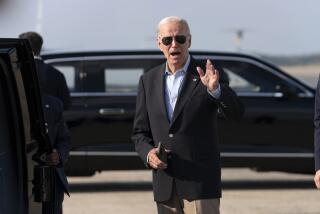Congressional Fund-Raising Probes Take Shape, Hits
- Share via
WASHINGTON — With Democrats crying foul, House and Senate committees Thursday launched separate campaign fund-raising investigations that will target the White House and largely exclude improprieties by members of Congress or past administrations.
The House omitted congressional wrongdoing altogether from its $3.8-million inquiry--aiming directly at “alleged fund-raising abuses of the Clinton administration and the Democratic National Committee.” The Senate, in a complex deal crafted by Majority Leader Trent Lott (R-Miss.), settled on a $4.35-million investigation of any “illegal activities” committed during the 1996 election cycle, but not those practices that merely appear improper or unethical.
“Congress is protecting itself,” said Sen. Wendell H. Ford (D-Ky.), who joined other Democrats on the Senate Rules Committee in voting against the Republican proposal. Ford offered an alternative that would have broadened the investigation’s scope to include questionable fund-raising practices and authorized a more modest $3-million budget.
The nature and scope of the two chambers’ investigations still must be approved in the coming weeks by the full House and Senate.
Originally, the Senate Governmental Affairs Committee inquiry would have included fund-raising practices in both congressional and presidential elections--even those at the edge of current law.
By limiting the investigation to illegalities, Lott resolved a political standoff within his own party that had threatened the inquiry. The deal was designed to satisfy GOP lawmakers anxious to focus on the White House and the Democratic Party and to leave unexamined the campaign finance loopholes from which they personally benefit.
“It doesn’t give us the same authority . . . but it gives us most of it,” Sen. Fred Thompson (R-Tenn.), the investigative committee chairman, said of the plan presented to him by party leaders.
Thompson acknowledged that the new language would largely exclude from his investigation the influence of soft money on political campaigns, as well as independent expenditures for candidates by outside organizations--both legal but widely criticized practices.
Still, Thompson noted that his committee’s investigation would extend to illegal campaign financing activities by members of Congress, although he could not say how much attention would go to either end of Pennsylvania Avenue. A more modest inquiry by the Senate Rules Committee will look at problems with the existing money-raising system.
Democrats criticized the GOP plan but stopped short of threatening a filibuster when it comes to the Senate floor for approval next week. Sen. John Glenn of Ohio, the ranking Democrat on Thompson’s committee, accused Republicans of tampering with the inquiry to save themselves from discomfort.
The Senate inquiry must finish its work by year’s end and then file a report a month later. Thompson had opposed the Dec. 31 deadline because, he said, shrewd lawyers could delay their cooperation well beyond that date.
The House investigation outlined by Republicans on Thursday is clearly targeted at the White House, with no specific ending date.
“We will seek to determine whether foreign governments and foreign companies were trying to buy influence with this administration and whether U.S. government policies were affected,” said Rep. Dan Burton (R-Ind.), chairman of the House Government Reform and Oversight Committee.
To justify the budget, Burton noted that he already has compiled a list of more than 700 potential witnesses. The budget includes requests for foreign-language interpreters, 200 staff trips and a $1,750 shredder.
Rep. Henry A. Waxman (D-Los Angeles) complained that Republicans are pushing the investigation forward “by fiat--not fairness and open debate.”
Atty. Gen. Janet Reno, meanwhile, said that she still sees no reason to appoint an independent counsel to investigate the fund-raising stir, despite a mounting clamor that she do so. At her weekly news briefing, Reno maintained that the legal threshold for an independent counsel had not been reached, despite new revelations involving Vice President Al Gore and Margaret Williams, chief of staff to First Lady Hillary Rodham Clinton.
The Senate Judiciary Committee is expected to vote next week to urge Reno to reconsider and justify her position in a report to Congress.
President Clinton offered his first public comment Thursday on speculation that dismissed White House aide Harold M. Ickes might have been seeking “revenge” when he turned over sensitive documents about the president’s 1996 reelection effort to a congressional committee.
“Absolutely not,” the president said in an interview with the National Journal, addressing reports that Ickes was trying to get even with Clinton, who relieved Ickes of his job as deputy chief of staff in a recent White House staff reorganization.
More to Read
Get the L.A. Times Politics newsletter
Deeply reported insights into legislation, politics and policy from Sacramento, Washington and beyond. In your inbox twice per week.
You may occasionally receive promotional content from the Los Angeles Times.










